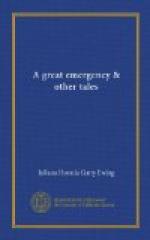At this moment there passed a boy, to whom I said, “Which is the way to London, if you please?” for there were four roads to choose from.
“What d’ say?” said the boy.
I repeated my question.
“Dunno,” he replied, trying to cram half his hand into his mouth. The captain would have thought him very stupid if he had met him as a native in one of the islands of the Pacific, I am sure; but I followed him, and begged him to try and think if he had not heard of people going to London.
At last his face brightened. He was looking over my head down the lane. “There’s a man a-cummin yonder’s always a-going to Lunnon,” said he. Visions of a companion on our tramp—also perhaps in search of adventures—made me look briskly round. “Him with the pipe, as b’longs to the barge,” the boy exclaimed.
It was indeed Mr. Rowe come to look for us, and we had to try and seem glad to see him, and to go on board once more.
Towards evening the canal banks became dotted with fishers of all ages and degrees, fishing very patiently, though they did not seem to catch much.
Soon after dark we reached the town of Pyebridge.
When the barge lay-to for the night, and the driver was taking the horse away to the stable, Mr. Rowe confronted us, in his firmest manner, with the question, “And where are you going to sleep, young gentlemen?”
“Where are you going to sleep, Mr. Rowe?” said I, after a thoughtful pause.
“I sleeps below, but the captain’s cabin is guv up to no one—unless it be the Queen,” replied the barge-master, humorously but decidedly.
“We should like to sleep on deck,” said I.
But Mr. Rowe would not hear of it, on account of various dreadful diseases which he assured us would be contracted by sleeping “in the damps of the water,” “the dews of the hair,” and “the rays of the moon.”
“There’s a hotel—” he began; but I said at once, “We couldn’t afford a hotel, but if you know of any very cheap place we should be much obliged.”
Mr. Rowe took off his hat and took out his handkerchief, though it was no longer hot. Having cleared his brain, he said he “would see,” and he finally led us along one of the pebbled streets of Pyebridge to a small house with a small shop-window for the sale of vegetables, and with a card announcing that there were beds to let. A very little old woman got up from behind a very big old geranium in the window as we entered, and with her Mr. Rowe made our arrangements for the night. We got a clean bed, and had a mug of milk and a slice of bread and treacle apiece for breakfast the next morning, and I paid two shillings. As I thanked the old lady and bade her good day, she called to me to hold out my hat, which she filled with cherries, and then stood at the door and watched us out of sight.
There was a railway station in Pyebridge, and we might easily have escaped from Mr. Rowe, and gone by train to London. But besides the fact that our funds were becoming low, the water had a new attraction for us. We had left the canal behind, and were henceforward on a river. If the wind favoured us we were to sail.




